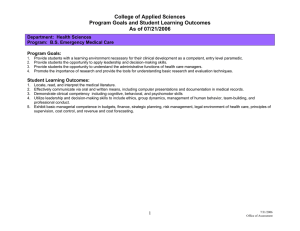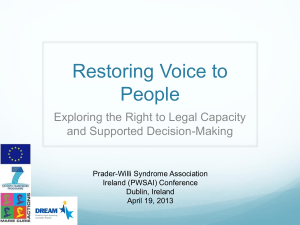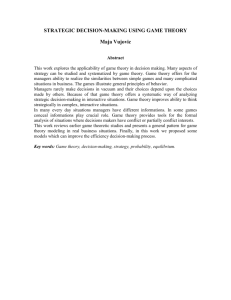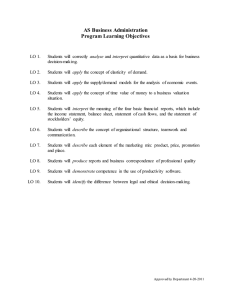The DREAM Training Network (Disability Rights Expanding Accessible Markets)
advertisement
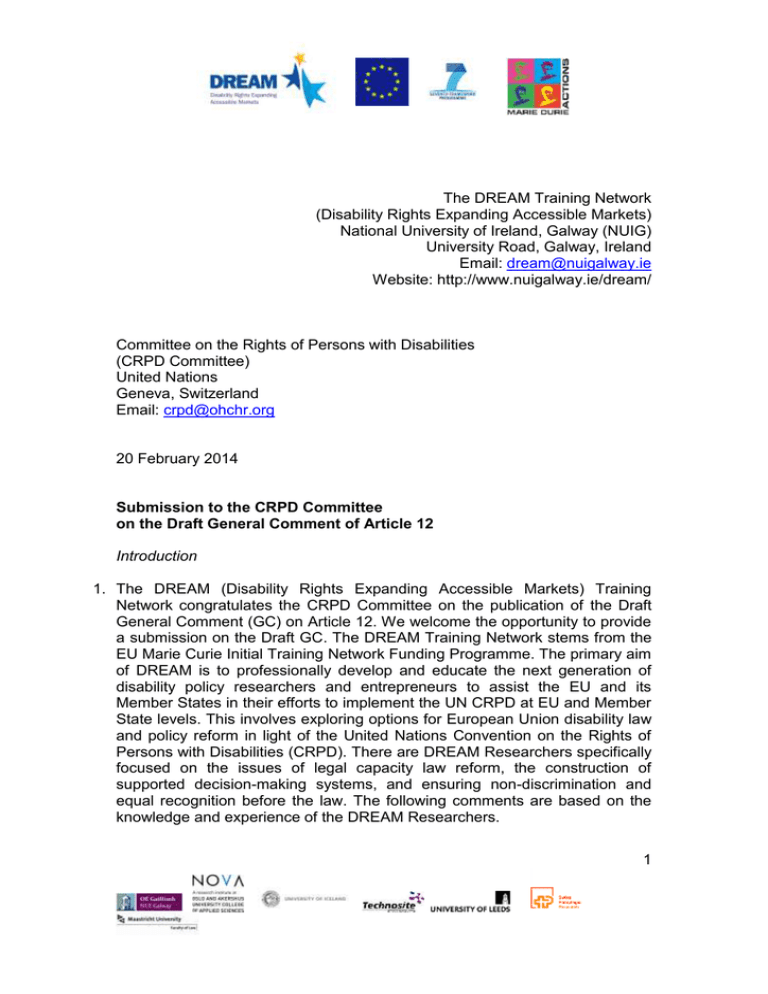
The DREAM Training Network (Disability Rights Expanding Accessible Markets) National University of Ireland, Galway (NUIG) University Road, Galway, Ireland Email: dream@nuigalway.ie Website: http://www.nuigalway.ie/dream/ Committee on the Rights of Persons with Disabilities (CRPD Committee) United Nations Geneva, Switzerland Email: crpd@ohchr.org 20 February 2014 Submission to the CRPD Committee on the Draft General Comment of Article 12 Introduction 1. The DREAM (Disability Rights Expanding Accessible Markets) Training Network congratulates the CRPD Committee on the publication of the Draft General Comment (GC) on Article 12. We welcome the opportunity to provide a submission on the Draft GC. The DREAM Training Network stems from the EU Marie Curie Initial Training Network Funding Programme. The primary aim of DREAM is to professionally develop and educate the next generation of disability policy researchers and entrepreneurs to assist the EU and its Member States in their efforts to implement the UN CRPD at EU and Member State levels. This involves exploring options for European Union disability law and policy reform in light of the United Nations Convention on the Rights of Persons with Disabilities (CRPD). There are DREAM Researchers specifically focused on the issues of legal capacity law reform, the construction of supported decision-making systems, and ensuring non-discrimination and equal recognition before the law. The following comments are based on the knowledge and experience of the DREAM Researchers. 1 Structural Comments 2. The GC is well constructed. The normative content, obligations of states parties, and implementation sections are clearly laid out and we recommend maintaining these as distinct sections. 3. The section, “Interrelationship of Article 12 with other Provisions of the Convention” should be reduced for clarity. Some parts are unnecessary and create confusion with the substance of the rights in Article 12. We recommend removing: “Article 9 Accessibility” (Para. 33) and “Article 22 Privacy” (Para. 43). While these issues are important, there is not space in a GC to fully explore them. They are not essential for the explanation of the rights and obligations in Article 12. We also recommend looking again at the whole of the Interrelationship section and removing unnecessary language and clarifying the connection to Article 12 and the corresponding state obligation in each area. 4. The GC should use the full title of all CRPD Articles. Therefore, change “Article 19 Independent Living” to “Article 19 Living independently and being included in the community.” Substantive Comments 5. A general comment on a core civil right, such as the right to equal recognition before the law, must focus on explaining the specific rights and obligations of states parties. It must also provide a framework for implementation. Information that does not pertain specifically to these key goals dilutes the message of the GC. We recommend re-examining the GC and removing all substance that is not directly meeting these goals. 6. In paragraph 23 of the GC, the definition of ‘substituted decision-making’ delineates three elements that comprise a substituted decision-making system. We recommend changing the ‘and’ between elements (ii) and (iii) to ‘or’. This change is essential in order to clarify the understanding of substituted decision-making. Any system that allows ‘best interest’ decisionmaking must be deemed ‘substituted decision-making’ because it does not respect the individual’s ‘rights, will and preferences’ as required by CRPD Article 12(4). The ‘and’ currently in place between elements (ii) and (iii) in paragraph 23 of the GC implies that “best interest’ decision-making is not substituted decision-making unless the elements (i) and (ii) are present as well (denial of legal capacity and an outside decision-maker imposed against the will of the individual). Similarly, any system where (i) legal capacity is denied and (ii) a representative is imposed against the will of the individual, also must be deemed substituted decision-making because it is in violation of 2 CRPD Article 12(1 and 2). It remains in violation of these two paragraphs regardless of whether best interests decision-making is also taking place. These problems can be solved simply by replacing the ‘and’ with an ‘or’ between elements (ii) and (iii) in paragraph 23 of the GC. 7. The GC is missing specific instruction for States Parties on how to implement Article 12 in ‘hard cases,’ where individuals are unable to communicate their will and preference or where the will and preference of the individual presents significant concerns regarding his or her health or wellbeing or the health or well-being of others. For example, when an individual is in a coma, has significant difficulty with communication, or when an individual is experiencing psychosis or other difficulty with interpreting reality. The GC must not be overly prescriptive. It must allow States to create structures that are adapted to their own societal landscapes, taking into account past systems and culturally specific communication and social mores. However, more detail in the GC is needed to provide a robust framework for states to build Article 12 compliant systems. 8. The GC must clarify that the right to legal capacity cannot be predicated on mental capacity (GC Paras. 12 and 13). However, there are times where a lack of understanding may prevent the exercise of legal capacity. Where any individual (with or without a disability) is experiencing difficulty understanding or making decisions that have legal affect, the state has an obligation to provide access to support in making that decision. This support will vary greatly depending on the nature of the decision and the level of support required by the individual. Some individuals may merely require accessible information, others may not have the ability to communication a decision and may need a support person to interpret and realize their will and preferences. 9. The state obligation under Article 12, only applies to decisions that have legal affect, meaning those decisions that amount to an exercise of legal capacity, as enumerated in Article 12(2 and 3). Whether or not an individual is exercising legal capacity when making a particular decision varies depending on the amount of state intervention that an individual experiences in her life. For example, and individual living in an institutional setting is sometimes forced to exercise her legal capacity even for basic decisions, such as clothing and food choices. In these cases, if she doesn't specifically exercise her legal capacity, the institutional authority will remove the decision-making power from her. However, individuals not living under an institutional authority, who have the freedom to make these daily decisions, are not forced to exercise their legal capacity in order to enforce their decision-making in these areas. 3 10. In the ‘hard cases’ the state has a responsibility to provide a support person who will be able to assist with the discovery and implementation of the individual’s will and preference. For example, where a decision with legal affect needs to be made and an individual is unable to communicate, after significant efforts have been made to facilitate communication, a support person must be provided to use any existing past knowledge of the individual’s will and preference, as well as knowledge gained from interaction with the individual and, where possible, the community that the individual lives in. Where an individual may be experiencing psychosis, delusion, or another form of altered reality, and no one can understand her will and preference, the state must provide a support person to assist the individual in making a decision – by providing assistance for the individual to arrive to a safe place, physically and psychologically, and then facilitating the decision-making process. However, this must never amount to forced treatment. If, after significant efforts, the support person is unable to understand the individual’s will and preference, and a decision needs to be made, then the support person may make a decision based on the closest approximation of what she believes to be the will and preference of the individual. Again, this must never amount to forced treatment. This requires eliminating the objective best interest standard and replacing it with a standard that strives to express and realize the will and preference of the individual. 11. The general comment should also include a recommendation for states to create statutory language protecting the right to legal capacity on an equal basis for all. This provides a statutory source for challenging unequal and discriminatory legal capacity denials. 12. The participation of people with disabilities in legal capacity law reform processes needs to be emphasized, as required by Article 4(3). 13. The GC does not specifically address how States Parties should transition individuals currently under substituted decision-making regimes into a support paradigm. We recommend including a paragraph on the unique needs of people who have experienced substituted decision-making. We also recommend a specific instruction to State Parties to review all cases of substituted decision-making to effectively transition these cases into a support model. 14. The nature of support for the exercise of legal capacity will vary among jurisdictions. The GC must provide key elements of those systems required for Article 12 compliance. Many of those elements are already included. We recommend adding language that specifies that all supports, including level of supports and the support person should be based on the decision of the 4 person receiving the support. This may be best placed in paragraph 25, under the section “Obligation of States Parties.” Conclusion 15. We thank the Committee again for the opportunity to provide this submission on the Draft GC. We welcome the publication of the final draft of the GC. 5

